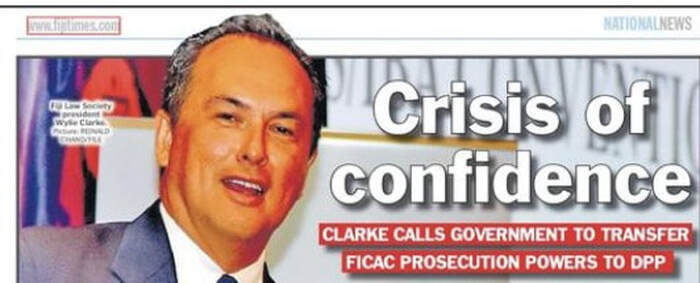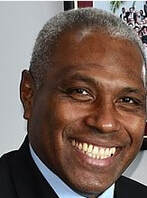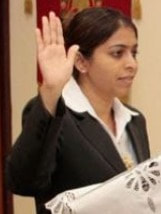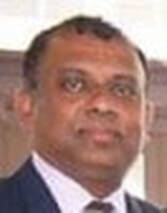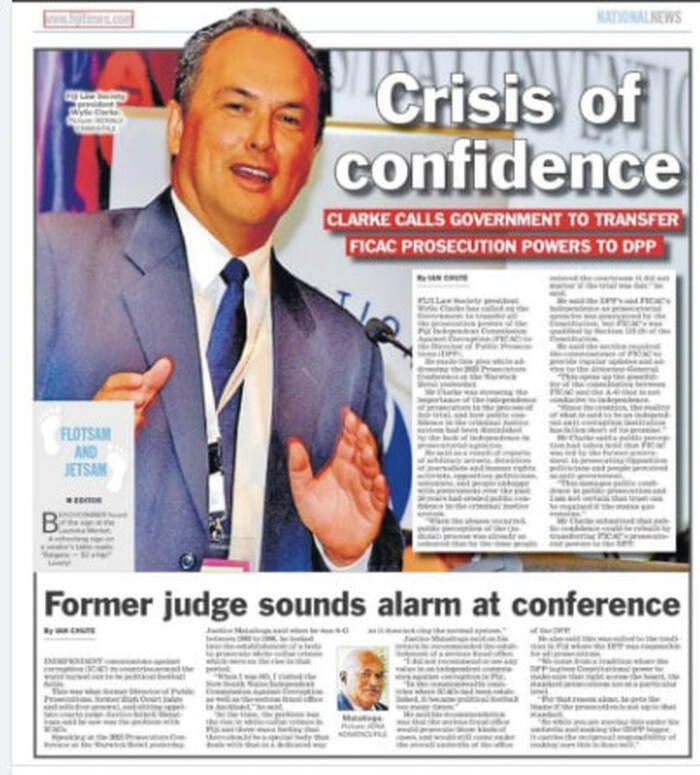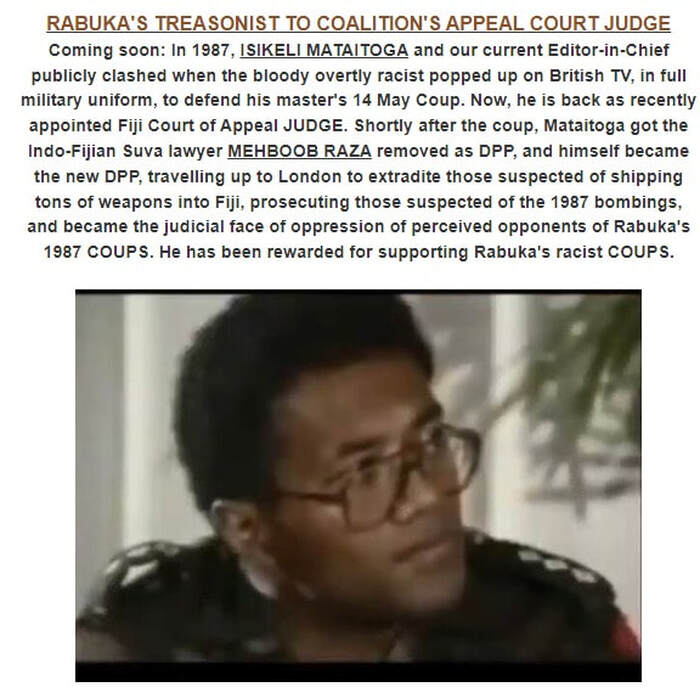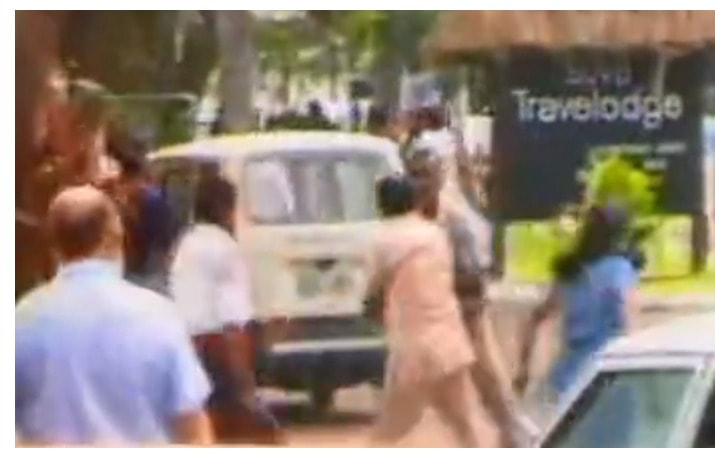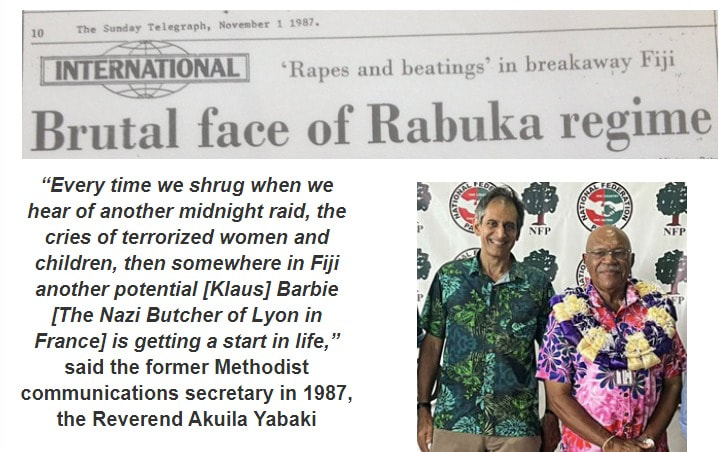Fijileaks: The first question that Clarke should have raised (and must) is why Richard Naidu's case, which is a CIVIL MATTER, is being heard before Justice Goundar who presides over CRIMINAL MATTERS
*Naidu's case should have been sent to JUSTICE ANJALA WATI who hears CIVIL MATTERS. It is right to ask if it could be because under criminal litigation Naidu's case can be retried?
*However, Naidu has been found guilty in a civil court thus he must be sentenced, and then only, he can appeal through the normal legal process - in the Fiji Court of Appeal
*Coming soon: The Legal Opinion on why the suspended DPP CHRISTOPHER PRYDE was WRONG not to send NFP leader, Finance Minister, and Coalition Deputy Prime Minister BIMAN PRASAD for trial before the Suva Magistrates Court for allegedly sexually harassing the former NFP provisional candidate Taniguchi's wife
JUDGE SHOPPING? Last Monday, the Fiji Law Society president Clarke was spotted having lunch together with the self-proclaimed CONVICTED LAWYER Richard Naidu at the foodhall above BSP Bank in Suva.
*As we chewed on Clarke's call for the Naidu negotiated Coalition government to transfer FICAC prosecution powers to the DPP, we wondered why Clarke had chosen not to comment and remain silent on Naidu's case that raise many fundamental legal questions.
*Of course, Clarke will retort with the usual 'bullsh*t' that the matter is before Justice Daniel Goundar in the Fiji High Court.
*Well, the first question that Clarke should have raised (and must) is why Naidu's case, which is a CIVIL MATTER, is being heard before Justice Goundar who presides over CRIMINAL MATTERS
*Richard Naidu's case should have been sent to JUSTICE ANJALA WATI who hears CIVIL MATTERS.
*It is right to ask if it could be because under criminal litigation Naidu's case can be retried?
*However, Naidu has been found guilty in a civil court thus he must be sentenced, and then only, he can appeal through the normal legal process.
*During submissions before Justice Goundar, he was reminded by Attorney-General's delegated lawyer Feizal Haniff that Naidu's case is a CIVIL MATTER?
*Naidu's lawyer and legal partner JON APTED also submitted that the proceedings were civil, governed by the High Court Rules of Civil Procedure. Apted is also Sitiveni Rabuka's nominee on the CoC.
*No wonder there is disquiet and a CRISIS OF CONFIDENCE in the judicial system, with lawyers and laymen asking whether this is not another case of JUDGE SHOPPING.
*Why is Haniff appearing for the A-G, when he (Haniff) began his legal career with Munro Leys and worked closely with Richard Naidu?
*Since Munro Leys and Naidu, the serial Coalition and NFP propagandist in the Fiji Times Opinion columns, are also legal advisers to the Fiji Times, we stand no chance to challenge Clarke, hence its here, in the Fijileaks, including the OPTIONS we had written some months ago that was available and not available to Naidu and his legal team.

*OPTIONS 2 and 3 don't apply to Naidu as his proceedings are of a civil nature thus he must be sentenced, then he can appeal his ruling to the Fiji Court of Appeal"
In cases with a conviction, there are a couple of options
Option 1
The first option is for the parties to make submissions relating to sentencing and see how the Court sentences the Defendant. The matter is before Justice Daniel Goundar.
Option 2
If the Defendant wants to set aside the conviction his lawyers could apply to arrest the Judgment similar to the powers under s. 239 of the Criminal Procedure Act 2009 i.e.
Motion in arrest of judgment
239. — (1) The accused person may, at any time before sentence, whether on a plea of guilty or otherwise, move in arrest of judgment on the ground that the information does not, after any amendment which the court has made and had power to make, state any offence which the court has power to try.
(2) The court may, in its discretion, either hear and determine the matter during the same sitting, or adjourn the hearing of it to a future time to be fixed for that purpose.
(3) If the court decides in favour of the accused he or she shall be discharged from that information.
Option 3
If the Defendant wants the Court to discharge him even after he has been convicted using the principles under the Sentencing and Penalties Act he could apply to do the same. This is possible even where there has been a conviction i.e
Release after conviction
44. — (1) A court may discharge a person whom it has convicted of an offence.
(2) A court, on convicting a person of an offence, may adjourn the proceedings for a period of up to 5 years and release the offender upon the offender giving an undertaking to comply with the conditions applying under sub-section (3), and any further conditions imposed by the court.
(3) An undertaking under sub-section (2) shall have conditions --
(a) that the offender shall appear before the court if called onto do so during the period of the adjournment, and if the court so specifies, at the time to which the further hearing is adjourned;
(b) that the offender is of good behaviour during the period of the adjournment; and
(c) that the offender observes any special conditions imposed by the court.
(4) A court may make an order for restitution or compensation in accordance with Part X in addition to making an order under this section.
(5) An offender who has given an undertaking under sub-section (1) may be called upon to appear before the court --
(a) by order of the court;
(b) by notice issued by a court officer on the authority of the court.
(6) If at the time to which the further hearing of a proceeding is adjourned the court is satisfied that the offender has observed the conditions of the undertaking, it must discharge the offender without any further hearing of the proceeding.
Option 4
The Defendant could appeal against the conviction and any sentence and take his chances in the Fiji Court of Appeal.
Option 1
The first option is for the parties to make submissions relating to sentencing and see how the Court sentences the Defendant. The matter is before Justice Daniel Goundar.
Option 2
If the Defendant wants to set aside the conviction his lawyers could apply to arrest the Judgment similar to the powers under s. 239 of the Criminal Procedure Act 2009 i.e.
Motion in arrest of judgment
239. — (1) The accused person may, at any time before sentence, whether on a plea of guilty or otherwise, move in arrest of judgment on the ground that the information does not, after any amendment which the court has made and had power to make, state any offence which the court has power to try.
(2) The court may, in its discretion, either hear and determine the matter during the same sitting, or adjourn the hearing of it to a future time to be fixed for that purpose.
(3) If the court decides in favour of the accused he or she shall be discharged from that information.
Option 3
If the Defendant wants the Court to discharge him even after he has been convicted using the principles under the Sentencing and Penalties Act he could apply to do the same. This is possible even where there has been a conviction i.e
Release after conviction
44. — (1) A court may discharge a person whom it has convicted of an offence.
(2) A court, on convicting a person of an offence, may adjourn the proceedings for a period of up to 5 years and release the offender upon the offender giving an undertaking to comply with the conditions applying under sub-section (3), and any further conditions imposed by the court.
(3) An undertaking under sub-section (2) shall have conditions --
(a) that the offender shall appear before the court if called onto do so during the period of the adjournment, and if the court so specifies, at the time to which the further hearing is adjourned;
(b) that the offender is of good behaviour during the period of the adjournment; and
(c) that the offender observes any special conditions imposed by the court.
(4) A court may make an order for restitution or compensation in accordance with Part X in addition to making an order under this section.
(5) An offender who has given an undertaking under sub-section (1) may be called upon to appear before the court --
(a) by order of the court;
(b) by notice issued by a court officer on the authority of the court.
(6) If at the time to which the further hearing of a proceeding is adjourned the court is satisfied that the offender has observed the conditions of the undertaking, it must discharge the offender without any further hearing of the proceeding.
Option 4
The Defendant could appeal against the conviction and any sentence and take his chances in the Fiji Court of Appeal.
At the same DDP Conference, another Judical Ghost from the Past - ISIKELI MATAITOGA
INDEPENDENT commissions against corruption (ICAC) in countries around the world turned out to be political football fields. This was what former Director of Public Prosecutions, former High Court judge and solicitor-general, and sitting appellate courts judge Justice Isikeli Mataitoga said he saw was the problem with ICACs.
Speaking at the 2023 Prosecutors Conference at the Warwick Hotel yesterday, Justice Mataitoga said when he was S-G between 1993 to 1996, he looked into the establishment of a body to prosecute white-collar crimes which were on the rise in that period.
“When I was SG, I visited the New South Wales Independent Commission Against Corruption as well as the serious fraud office in Auckland,” he said.
“At the time, the problem was the rise in white-collar crimes in Fiji and there was a feeling that there should be a special body that deals with that in a dedicated way so it does not clog the normal system.”
Justice Mataitoga said on his return he recommended the establishment of a serious fraud office.
“I did not recommend or see any value in an independent commission against corruption in Fiji.
“In the commonwealth countries where ICACs had been established, it became political football too many times.”
He said his recommendation was that the serious fraud office would prosecute those kinds of cases, and would still come under the overall umbrella of the office of the DPP.
He also said this was suited to the tradition in Fiji where the DPP was responsible for all prosecutions.
“We come from a tradition where the DPP is given Constitutional power to make sure that right across the board, the standard prosecutions are at a particular level.
“For that reason alone, he gets the blame if the prosecution is not up to that standard.
“So while you are moving this under his umbrella and making the ODPP bigger, it carries the reciprocal responsibility of making sure this is done well.”
INDEPENDENT commissions against corruption (ICAC) in countries around the world turned out to be political football fields. This was what former Director of Public Prosecutions, former High Court judge and solicitor-general, and sitting appellate courts judge Justice Isikeli Mataitoga said he saw was the problem with ICACs.
Speaking at the 2023 Prosecutors Conference at the Warwick Hotel yesterday, Justice Mataitoga said when he was S-G between 1993 to 1996, he looked into the establishment of a body to prosecute white-collar crimes which were on the rise in that period.
“When I was SG, I visited the New South Wales Independent Commission Against Corruption as well as the serious fraud office in Auckland,” he said.
“At the time, the problem was the rise in white-collar crimes in Fiji and there was a feeling that there should be a special body that deals with that in a dedicated way so it does not clog the normal system.”
Justice Mataitoga said on his return he recommended the establishment of a serious fraud office.
“I did not recommend or see any value in an independent commission against corruption in Fiji.
“In the commonwealth countries where ICACs had been established, it became political football too many times.”
He said his recommendation was that the serious fraud office would prosecute those kinds of cases, and would still come under the overall umbrella of the office of the DPP.
He also said this was suited to the tradition in Fiji where the DPP was responsible for all prosecutions.
“We come from a tradition where the DPP is given Constitutional power to make sure that right across the board, the standard prosecutions are at a particular level.
“For that reason alone, he gets the blame if the prosecution is not up to that standard.
“So while you are moving this under his umbrella and making the ODPP bigger, it carries the reciprocal responsibility of making sure this is done well.”
